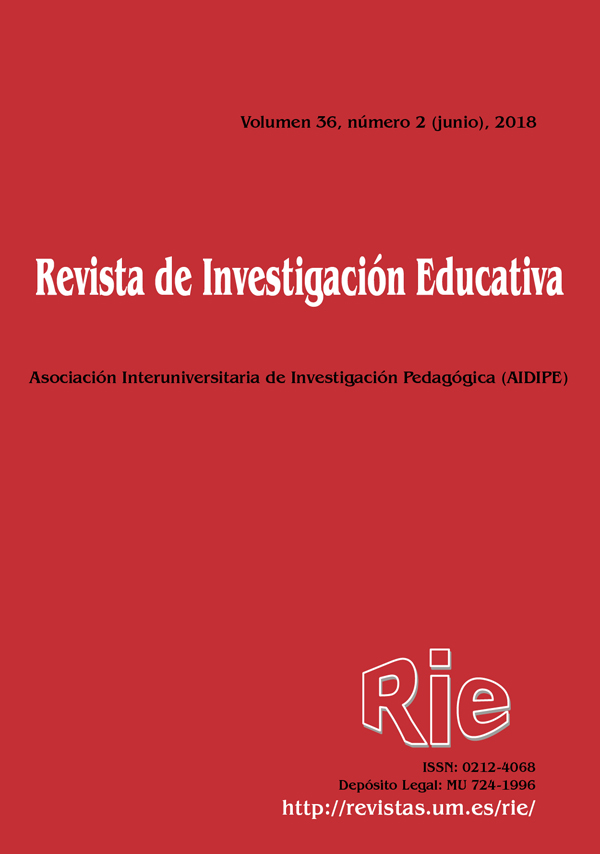Educational research: utility as a social criterion of quality
Abstract
In general, the educational community considers the educational research does not provide useful results. We try to reflect on the basis of this opinion, trying to provide proposals in order to reach the objective that we consider prioritative in educational research: provide reasonable explanations of the facts or phenomena studied in order to contribute to the creation of a coherent body of knowledge, oriented to produce the necessary information to improve the educational practice. But it is not easy reach an agreement when we want to establish the true purpose of our research or delimit its characteristics: for some people it is about developing knowledge about educational processes while others consider the improvement of practice as a priority.Downloads
-
Abstract7970
-
PDF (Español (España))6177
References
Alonso, P. (2005). Calidad en investigación (2ª parte). Aproximación metodológica a las actividades de investigación. Revista de Investigación en Gestión de la Innovación y Tecnología, 33.
Bunge, M. (1980). La investigación científica. Barcelona, España: Ariel.
Bunge, M. (2003). La investigación básica. La gallina de los huevos de oro. Discurso de recepción del Doctorado Honoris Causa. Universidad de Salamanca. http://www.tindon.org/bunge.html
Campbell, D.T., & Stanley, J. C. (1978). Diseños experimentales y cuasiexperimentales en la investigación social. Buenos Aires: Amorrortu.
Carr, W., & Kemmis, S. (1988). Teoría crítica de la enseñanza. Barcelona, España: Martínez Roca.
CIDE (2001). Treinta años de investigación educativa institucional en España. Madrid, España: MEC-CIDE.
Clark, J. A. (1994). Objectivity, subjectivity and relativism in Educational Research. Curriculum Inquiry, 24, 1, 81-94.
De la Orden, A., & Mafokozi, J. (1999). La investigación educativa: Naturaleza, funciones y ambigüedad de sus relaciones con la práctica y la política educativas. Revista de Investigación Educativa, 17, 1, 7-29.
Dendaluce, I. (1988). Una reflexión metodológica sobre la investigación educativa. En I. Dendaluce (ed): Aspectos metodológicos de la investigación educativa (13-45). Madrid, España: Narcea.
Díaz Costa, E. (2009). Impacto de la investigación educativa en la práctica docente. Granada, España: Tais.
Fernández Esquinas, M. (2003). Criterios de calidad en la investigación social: la producción de datos sociales. Empiria. Revista de Metodología de Ciencias Sociales, 6, 47-77. Gibbons, M. y otros (1997). La nueva producción del conocimiento. Barcelona, España: Pomares-Corredor.
Habermas, J. (1984). Ciencia y técnica como ideología. Madrid, España: Tecnos.
Latorre, A. (2007). Investigación-acción. Conocer y cambiar la práctica educativa. Barcelona, España: Grao.
Lewin, K. (1951). Field theory in social science. New York: Harper and Row.
Lewin, K. (1978). La teoría de campo en la ciencia social. Buenos Aires: Paidós.
MECD (2013). Objetivos educativos europeos y españoles. Estrategia educación y formación 2020. Ministerio de Educación, Cultura y Deporte. Madrid, España: MECD.
Perines, H., & Murillo, F. J. (2017). ¿Cómo mejorar la investigación educativa? Sugerencias de los docentes. Revista de la Educación Superior, 46, 181, 89-104. http://dx.doi.org/10.1016/j.resu.2016.11.003
Sabariego, M. (2004). La investigación educativa: génesis, evolución y características. En R. Bisquerra (Coord.). Metodología de la Investigación Educativa (pp. 20-49). Madrid, España: La Muralla.
Stenhouse, L. (1991). Investigación y desarrollo del currículum. Madrid, España: Morata.
Tejedor, F. J. (1988). El soporte estadístico en la investigación educativa. En I. Dendaluce (Ed.). Aspectos metodológicos de la investigación educativa (pp. 228-244). Madrid, España: Narcea.
Tejedor, F. J. (1994). La experimentación como método de investigación educativa. En V. García Hoz (Coord.). Problemas y métodos de investigación en educación personalizada (pp. 256-285). Madrid, España: Rialp.
Tejedor, F. J. (2004). Investigación educativa: ¿Hacia dónde vamos? En L. Buendía, D. González y T. Pozo (Coords.). Temas fundamentales en la investigación educativa (pp. 63-107). Madrid, España: La Muralla.
Tejedor, F. J. (2005). Algunas reflexiones sobre el devenir de la investigación educativa a lo largo del siglo XX. En Trillo, F. (Coord.). Las ciencias de la educación de ayer al mañana (pp. 247-284). Servicio de Publicaciones de la Universidad de Santiago de Compostela. Santiago de Compostela, España.
Tejedor, F. J., & García-Valcárcel, A. (2012). Sociedad tecnológica e investigación educativa. Revista Española de Pedagogía, 251, 3-26.
Tójar, J. C. (2001). Planificar la investigación educativa: Una propuesta integrada. Buenos Aires: Fundec.
Tójar, J. C. (2006). Investigación cualitativa: Comprender y actuar. Madrid, España: La Muralla.
UOC (2013). Crear escuelas que preparen para el futuro. https://www.macba.cat/es/debates-edu-hans-richard-gerver
Van Dalen, D. B., & Meyer, W. J. (1994). Manual de técnicas de investigación educativa. Buenos Aires: Paidós.
The articles and scientific documents published in RIE abide the following conditions:
1. The Servicio de Publicaciones de la Universidad de Murcia (the publisher) has the property rights (copyright) of all the documents published and allows the reuse under the user’s license indicated in point 2.
2. All documents are published in the digital edition of RIE under a Creative Commons Reconocimiento-NoComercial-SinObraDerivada 4.0 Internacional. (legal document) license. These documents can be copied, used, distributed, communicated and explained publicly if: i) the author(s) and its original source of publishing (magazine, publisher and URL of the document) are cited; ii) it is not used for commercial purpose; iii) the existence and the specifications about this license are mentioned.
3. Auto-archive’s conditions. The authors are allowed and encouraged to digitally distribute the pre-print versions (a version before evaluation) and/or post-print (a version that it is already evaluated and accepted to its publication). This promotes circulation and distribution earlier and can increase the citations and significance within the academic community.









